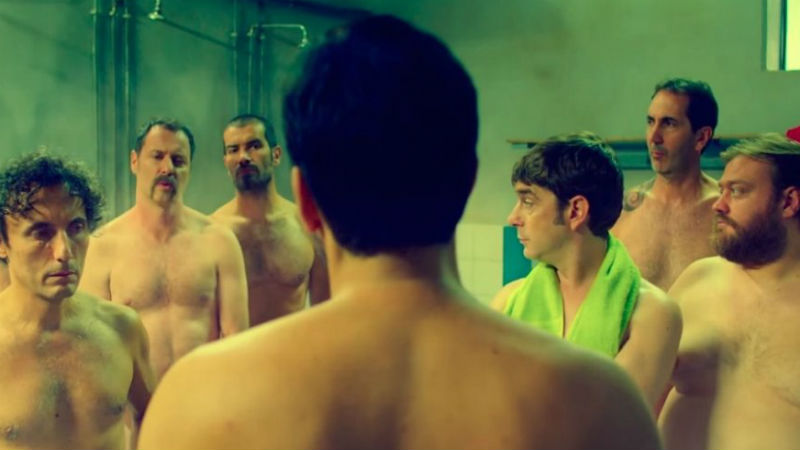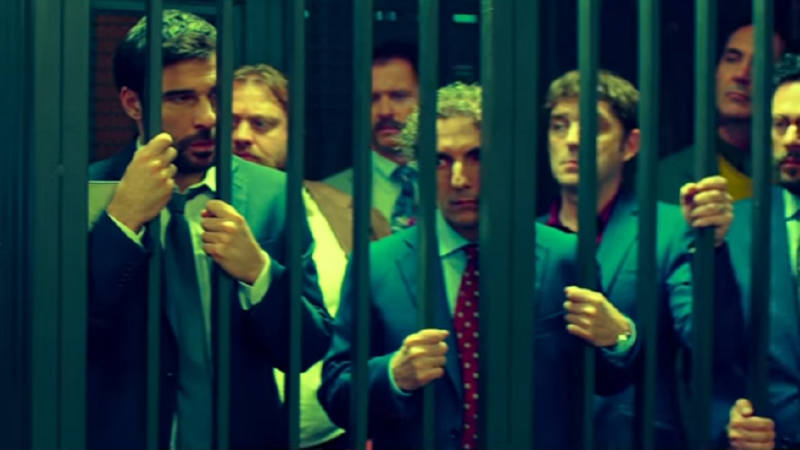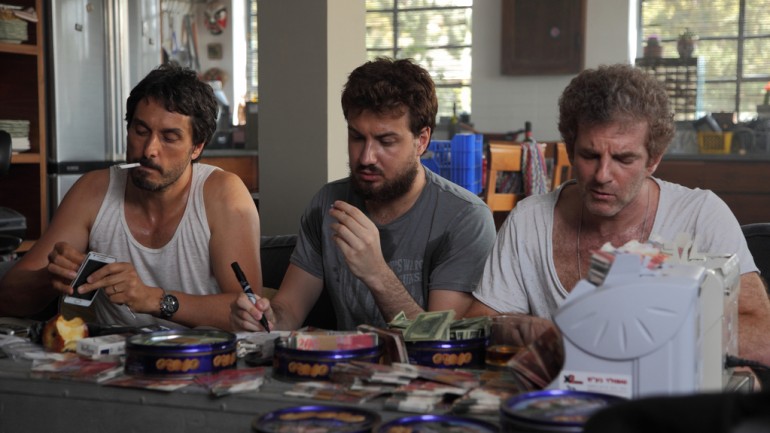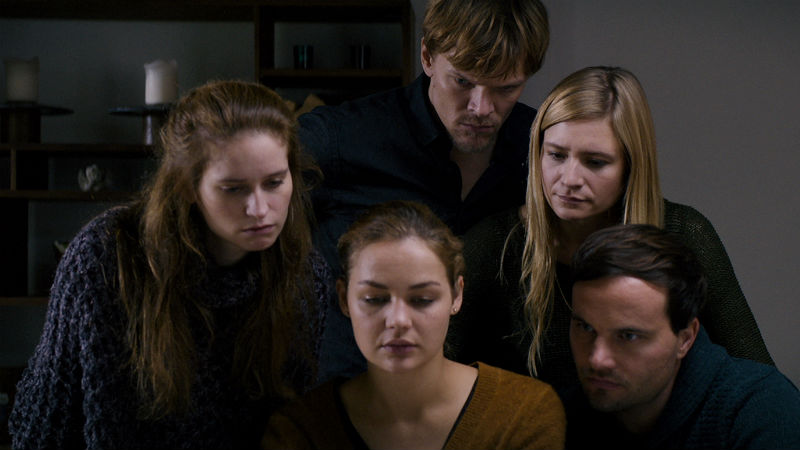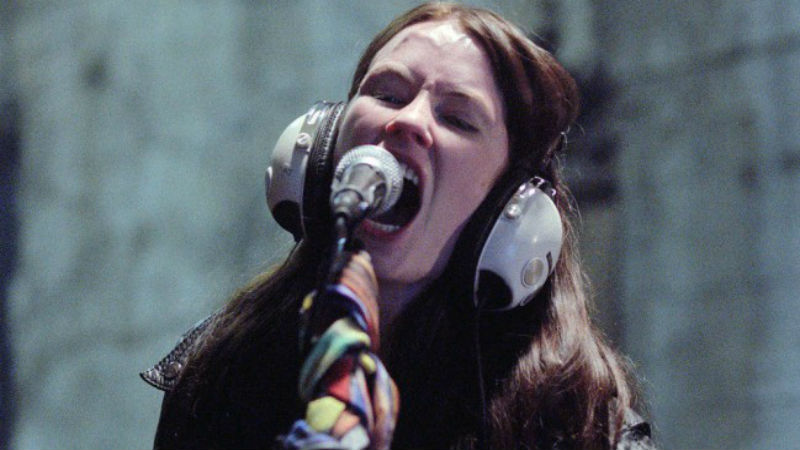DMovies first joined forces with Under the Milky Way and The Film Agency in 2017. Our objective to reclaim the hidden gems of European film often overlooked. These movies are part of the Walk This Way project, which is funded by EU Media (a sub-programme of Creative Europe) and is aimed at fostering and promoting straight-to-VoD European cinema. The Film Agency is handling the PR and communications of the initiative.
According to Walk This Way coordinator Nolwenn Luca “Walk this Way defends the diversity of European documentary works. The public thanks to the programme have the chance to have access to films that they would not have been able to discover otherwise if they were not available in VoD”.
We renewed our partnership in 2018, helping to promote and take a different, refreshing look at cinema make in all corners of Europe. The 18 films this year ranged from Latvia to Spain, from the Netherlands to Italy, touching on topics as varied as painting (The Key to Dali), serial killers, (Profilers: Gaze into the Abyss), cooking (Step Up the Plate), disability (Life Feels Good), grieving (Tonio) and even a very dirty and twisted Santa Claus (Le Pere Noel). Check out all the details, exclusive reviews and how to watch these films by scrolling down.
And that’s not all. On October 26th, DMovies, Walk This Way and Infinita Productions held a very successful industry event in the heart of London, at the prestigious May Fair Hotel (which is also home to the London Critics’ Award). The event was entitled An Evening of Straight-to-VoD, and it included the screening of VoD hit Home (Fien Troch, 2016), a debate about the future of Straight-to-VoD and networking drinks. Find out the event’s key messages and learning curves by watching the video below:
Walk This Way, the Creative Europe MEDIA programme supported project, now closes 4th edition. Along the way, 39 right-holders have trusted the initiative to give visibility to a wealth of 156 European films, reaching audiences in 48 countries around the world. You can find out more about Walk This Way, key facts and figures in the infographic below:
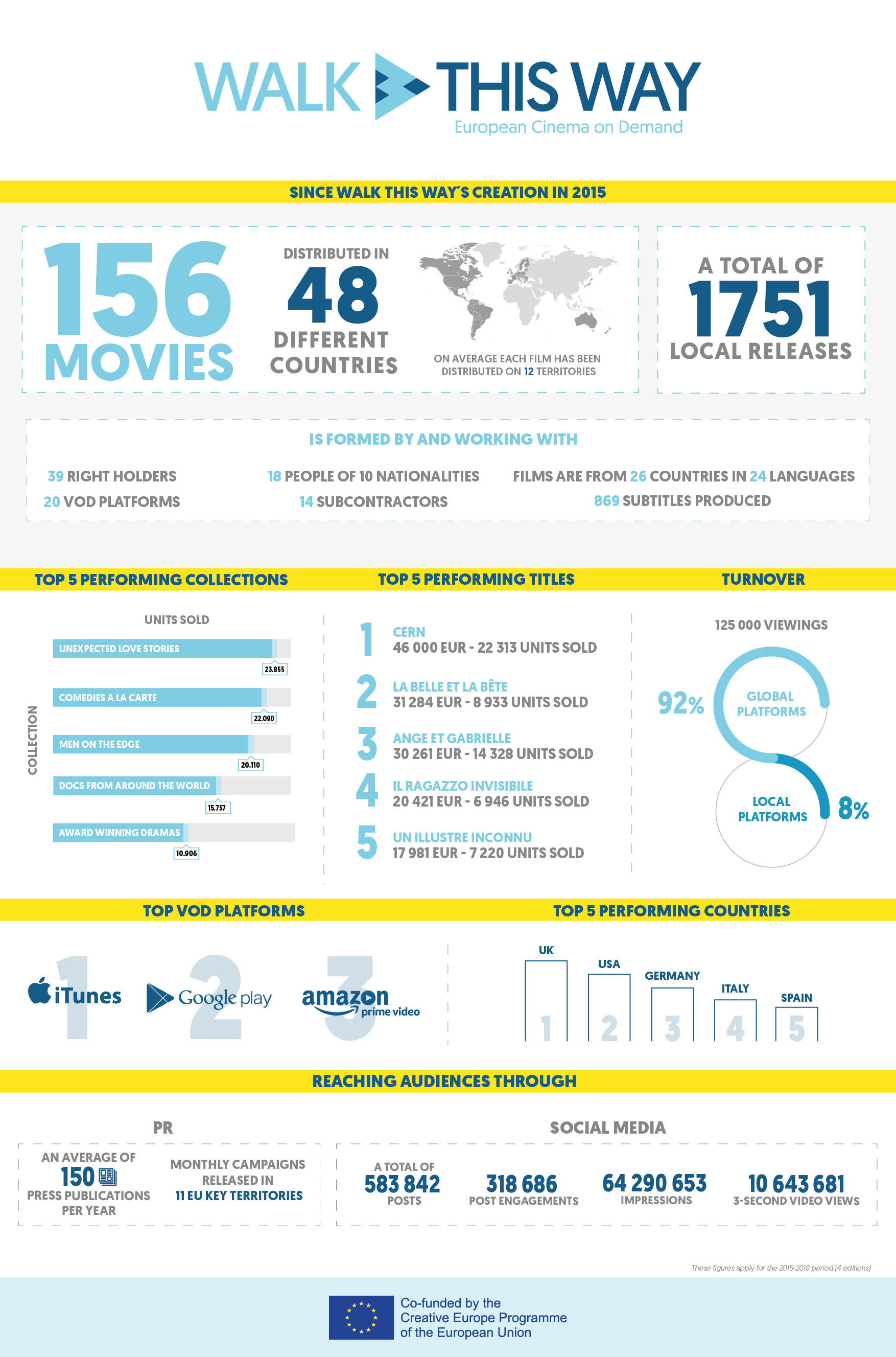
And there’s more information in the video below:
And here is the full list of dirty gems released in 2018. Just click on the film title in order to accede to our exclusive film review!
…
.
1. 10 Billion (Valentin Thurn, 2015):
What will happen when the food runs out of food? Well, in his 2015 documentary Valentin Thurn places this very notion front and centre! Exploring the scientific, agricultural and environmental ways we can prevent global food shortages, all due to global warming, it’s not a feature filled with bias but educated solutions to an impending world problem. Globe jumping from India to England then Germany, the multifaceted nature of its tone makes the issues it is dealing with a tangible reality for the viewer.
.
2. A Symphony of Summits: The Alps from Above (Peter Bardehle and Sebastian Lindemann, 2016):
Part of Europe’s natural beauty, The Alps are towering force over every country they touch. Approaching the scope of the natural phenomena in a highly cinematic manner, directors Peter Bardehle and Sebastian Lindemann deploy a cineflex camera to capture every inch of its beauty in filmic splendour. Telling the tale of its history, socio-political and geographical story, the sweeping shots of the snow-tipped mountains interpolate you into its vistas. Accompanied by the Germanic tones of Emily Clarke-Brandt, man and nature are combined into one form.
3. The Key to Dali (David Fernández, 2016):
This Spanish documentary explores Tomeu L’Amo’s maverick purchase of surrealist artist, Salvador Dali’s, first work for a cut-price 25,000 Spanish pesetas in 1988 (£132 in today’s money). Scratching away at the persona of L’Amo, scenes from the documentary allude towards a recent trend of re-creating history or pastness through a post-modern reimagination. Though the elaborate nature of the man could shadow the work, what emerges is a contemporary discussion on elitism, to which is unearthed in many aspects of society. Unlike the recent retelling of the life of Van Gough in Loving Vincent (Dorota Kobiela and Hugh Welchman, 2017) it is undeniable that The Key to Dali is grounded in the real world, opening pathways for art fans or not into the world of painting.
.
4. Profilers: Gaze into the Abyss (Barbara Eder, 2015):
Adopting the same global view as 10 Billion (Valentin Thurn, 2015), Barbara Eder’s hard-hitting work on the men and women whose job it is to investigate killers does not any soft punches. Intertextually referencing The Silence Of The Lambs, (Jonathan Demme, 1991) in numerous conversations, the grotesque nature of the classic is expressed as a means of the verbal descriptions. Not venturing into sadistic footage of murders etc, this doc holds respect for the victims. A natural intuition, we as humans constantly seek to explain the un-explainable and Eder’s film elicits this notion poignantly..
.
5. Free Lunch Society (Christian Tod, 2017):
The concept of Universal Basic Income (UBI) has been around in some form or another for over half a century, but in recent years it has grown so much in prominence that even entire countries are considering implementing it. Spanning both the hard left and the libertarian right, UBI is an Utopian idea that threatens the very ideals of what most consider to be the economic ordering of society. The latest film from Christian Tod considers the possibility of such a scheme, amassing a wide variety of politicians, activities and businessman to discuss its potential revolutionary aspects. The result is both a fine primer on the history of the scheme and a look forward towards how it may change the world we live in.
.
17-year-old Kevin, sentenced for violent behaviour, is just let out of prison. To start anew, he moves in with his aunt and her family and begins an apprenticeship at her store. Quickly he adapts to his new home and gets along well with his cousin Sammy, in his last year of high school. Through Sammy and his friends, Kevin meets John. Upon discovering John’s unbearable situation with his mother, Kevin feels the urge to help his new friend. One evening fate intervenes and questions of betrayal, trust and loyalty start to direct their daily lives more than ever.
.
7. Mellow Mud (Renars Vimba, 2016):
Loneliness, disillusionment and the experience of first love reveal the character of Raya, a 17-year-old living in rural Latvia with her grandmother and her little brother Robis. A staggering turn of events shakes up their lives, and the young girl must come to decisions that even a grown woman would find difficult to make.
.
8. Bobbi Jene (Elira Lund, 2018):
Elvira Lind’s documentary profile of contemporary dancer Bobbi Jene Smith captures new beginnings, endings, and everything in between, and faces the fact that you can switch your life around at just about any time. Having left Guillard at 21 to join Israeli dance troupe Batsheva, we meet Bobbi in a state of arrested development, but about to change things. As a dancer her accomplishments are unparalleled, but she’s now 31 with a Kanken Backpack, a decade younger boyfriend, and little of her own agency.
.
9. Fair Play (Andrea Sedlácková, 2014):
Set set for both a personal and a political journey. From the moment we enter Irene (Anna Gieslerova) and Anna’s (Judit Bardos) apartment, we are clearly in Eastern Europe during the Communist era. The evocatively decorated surroundings with ‘pull out bed’ and utilitarian furnishings, the drab clothing and simple bread and cheese breakfast immerse us immediately in this world. The country is Czechoslovakia, and the decade is the 1980s. As Irene switches on the ‘Free Europe’ radio channel, we meet a woman who is willing to risk listening to forbidden news, glimpsing her position on the political system under which she is forced to exist. Mother and daughter share the extraordinary ability of elite athletes, giving them opportunities not afforded to most citizens.
Not available in the UK.
.
10. Fukushima, A Nuclear Story (Matteo Gagliardi, 2015):
The Fukushima Daiichi nuclear disaster on March 11th 2011 marked a turning point in the history of the Japan, when an earthquake followed by a tsunami hit the Tepco Nuclear Power Plant on the country’s Pacific coast. It was the first time in history that the Japanese government declared a nuclear emergency. It was also the first time ever Emperor Akihito spoke on television directly to his people. The last time an emperor broadcast a message live to his people was when his father Hirohito announced the end of WW2.
.
11. I Can Quit Whenever I Want (Sydney Sibilia, 2014):
This film is a clash between the “rise-and-fall” gangster genre and a traditional fish-out-of-water comedy. Director Sydney Sibilia does a great job of depicting his group of oddballs adapting to their new life. Plot-wise, comparisons to the TV series Breaking Bad are inevitable, but while the acclaimed TV series carefully built up its world block by block, I Can Quit Whenever I Want is a much looser affair. In fact, with all its hyper-specific nerd jokes, it is closer in tone to The Big Bang Theory. The mileage of these jokes will vary with how much you understand each subject.
.
12. One Wild Moment (Jean-François Richet, 2015):
It all starts like a conventional French comedy. Laurent (Vincent Cassel) and Antoine (François Cluzet) are old friends going on holiday with their daughters, Louna (Lola Le Lann) and Marie (Alice Isaaz). But initial appearances can be deceiving, as director Jean-François Richet has something far deeper on his mind. A remake of the 1977 film with the same title, One Wild Moment exploits the limits of male desire, offering up a queasy moral play with no easy answers. As the title suggests, the film is structured around one key incident; the seduction of Laurent by Louna by the beach during a party. She may be the one who has started it, but she is only 17 and his best friend’s daughter, making Laurent’s willingness to go along with it all that more problematic.
.
13. Heart of Glass (Jérôme de Gerlache, 2016):
They’ve chosen to name this work Heart of Glass, which evokes the existence of two widely-rcognised projects, the first typified from Joseph Conrad’s prose detailing the descent from maddening stance to madness, the other Blondie’s greatest song, one of the few New Wave records that sounds more contemporary with age. This Heart of Glass, on the other hand, shows how passionate work can saves lives and challenge the human experience in entirely novel ways, in the hands glass artist Jeremy Maxwell Wintrebert.
.
14. Step Up to the Plate (Paul Lacoste, 2012):
An ensemble piece that combines fly-on-the-wall observation with lyrical reflections on the Bras family and food, plus a warm work that expertly depicts the passing of the baton– that’s probably the most succinct and accurate way of describing the documentary Step Up The Plate. The French title Entre Les Bras has a double meaning that’s impossible to translate: it means both “in your arms” and “amongst the Bras”.
It stars Michel Bras, owner of the the world-acclaimed three Michelin-star rated Bras restaurant in Laguiole, Southern France, and his son, Sebastien, who has worked in the restaurant for over 15 years and is being prepped to take over.
.
15. Life Feels Good (Maciek Piepryca, 2013):
Getting the disability biopic right can be a difficult task. Lean too hard on the struggle and it can feel exploitative, lead too hard on the sentimentality and it can feel mawkish. Life Feels Good, directed by Maciej Pieprzyca, manages to avoid these pitfalls to discover the deeply human story underneath. Depicting one Polish man’s struggle with cerebral palsy from 1987 to almost the present day, Life Feels Good is a heartwarming and uplifting tale that never softens the edges and is that much stronger for it.
.
16. Tonio (Paula Van Der Oest, 2016):
There is much to be made from death leading to life. Tonio (Chris Peters) is a 21-year-old finding joy through photography. His ambitious father, novel writer Adri (Pierre Bokma), has a differing view on life, while his wife Mirjam (Rifka Lodeizen) plays the peacekeeper in what still appears to be a functional family unit. The film cuts quickly to the untimely death Tonio undergoes and the grief his parents have to endure from now on. At times the film tries to find answers to grief, an unanswerable commotion, and the performances are stellar. A cutback to the past shows two new parents finding joy sleeping with their new baby.
1.
17. Father-Son Bootcamp (Emile Gaugreault, 2015):
Being a good father to a son is not an easy task. And neither is being a good son to a father. The bizarre and grotesque societal connotations of masculinity will often stand on the way of what should be a beautiful and tender relationship. As a result, fatherly love is often murky, sons are traumatised and whole notion of affection is mired in mud. Thankfully someone in France invented a father-son bootcamp where the two generations can reconnect through group therapy and bizarre activities. Well, actually the outcome isn’t as rosy as many would hope!
.
18. Santa Claus (Alexandre Coffre, 2014):
Nailing both the comic and sentimental sides of the festive farce, Le Père Noël is the perfect kind of holiday film to settle down to after a few mulled wines. Fun and tender in equal measure, it makes the most of its inspired conceit, cleverly pairing a career criminal with a young child slowly coming into contact with the cruel ways of the adult world. Key to the film’s mischievous sense of misdirection is its opening, layering different children’s Christmas wishes on top of each other. It lulls us into a false sense of security, thinking that this will be a very run-of-the-mill Christmas tale.









